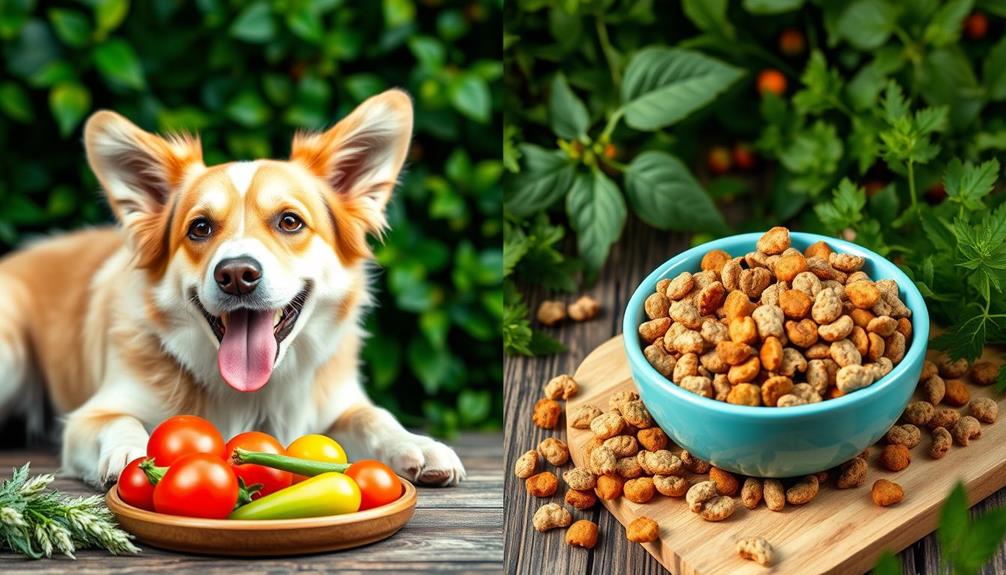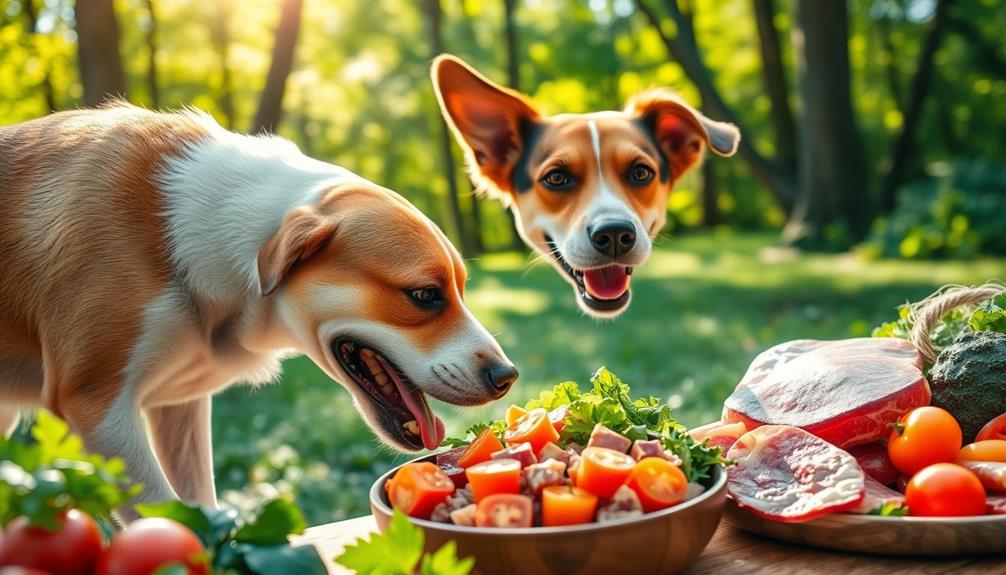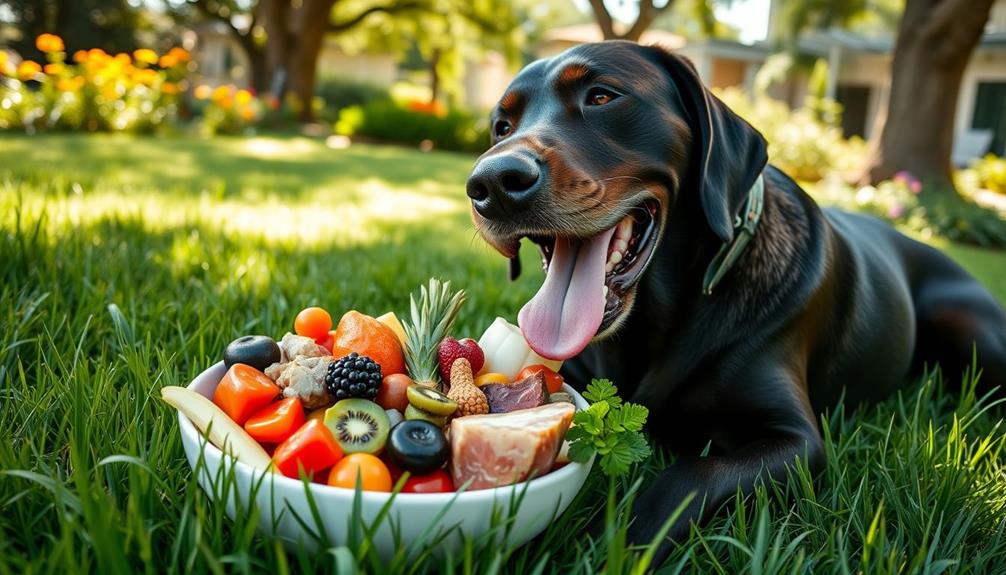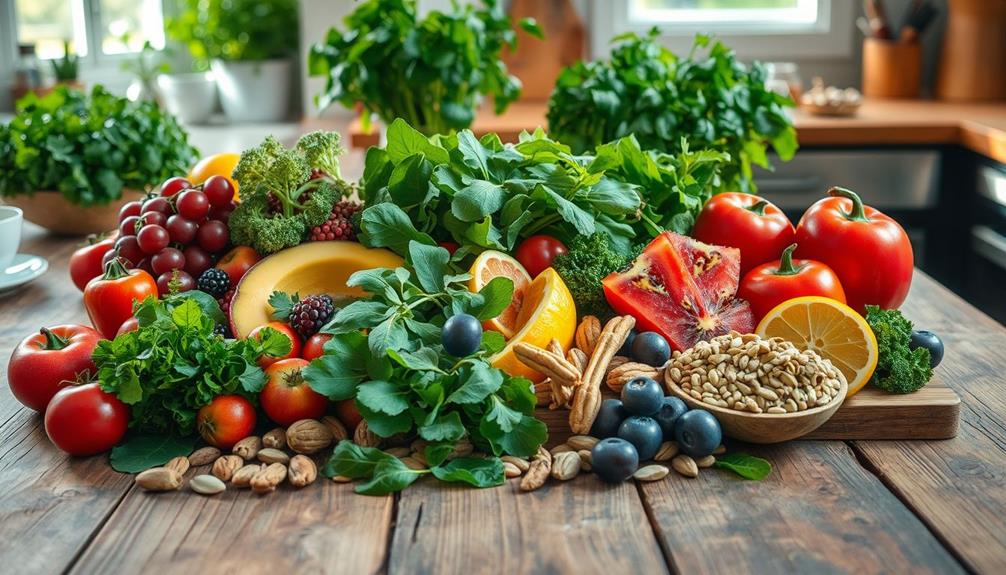A raw food diet can offer benefits like shinier coats, increased energy, and cleaner teeth for your dog. However, it also carries risks, such as bacterial contamination and potential nutritional imbalances. Individual factors like age, size, and health conditions greatly influence whether this diet is suitable for your pet. While some dogs thrive on raw food, others may experience digestive issues or need specific nutrients that a raw diet might lack. It's essential to consult with a veterinarian to create a balanced plan tailored to your dog's needs. Keep exploring to uncover more details about this dietary approach.
Key Takeaways
- Raw food diets may enhance coat quality, energy levels, and dental health due to high protein content and natural ingredients.
- Risks include bacterial contamination, choking hazards, and potential nutritional deficiencies without proper planning and preparation.
- Individual dog needs vary; age, size, and health conditions can influence suitability and digestive ability of raw diets.
- Higher costs and time investment for meal preparation may deter some owners from adopting a raw food diet.
- Veterinary consultation is crucial to ensure balanced nutrition and safe handling practices when considering a raw food diet.
Understanding Raw Dog Food
When you consider a raw dog food diet, it's important to understand that it closely resembles what canines ate in the wild, focusing on raw meat, bones, fruits, and vegetables. Advocates of raw diets often claim various health benefits, like shinier coats and increased energy levels.
However, not all dogs are suited for this type of feeding. Factors such as age, size, allergies, and underlying health conditions can influence whether a raw diet is appropriate for your pet. For instance, certain types of cold medications may interact with a raw diet, affecting your dog's overall health.
For instance, working dogs might require more calories than a typical raw diet can provide. On the other hand, senior dogs with digestive issues may struggle with raw food.
It's also essential to be aware of the risks involved, such as bacterial contamination from raw meat, which can pose threats to both your dog and your household. To guarantee your dog receives a balanced diet and avoid nutritional deficiencies, proper veterinary advice is essential.
Consulting with your vet can help you tailor a raw dog food plan that meets your canine's specific needs, making feeding a raw diet a safe and beneficial choice for the right dog.
Health Benefits of Raw Diet
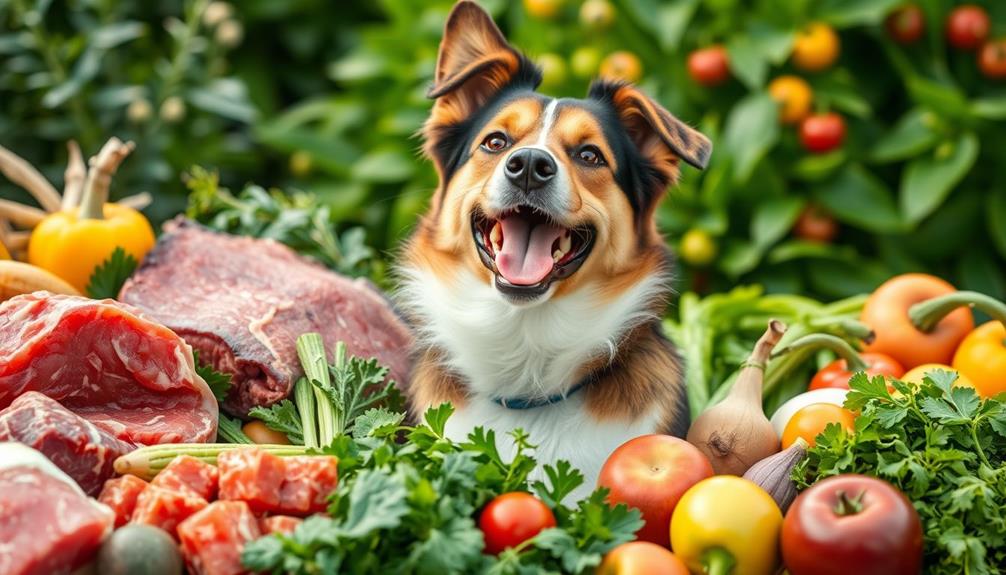
Many dog owners have turned to raw diets, drawn by the numerous health benefits they can offer. One of the most notable advantages is the high protein content found in raw food diets. This not only promotes muscle development but also leads to a shinier coat and healthier skin for your furry friend.
Additionally, incorporating fresh fruits and vegetables can further enhance the nutritional profile of your dog's meals, as seen in the proper diet for hamsters. You might also notice cleaner teeth and fresher breath, as the act of chewing raw meat and bones helps maintain oral hygiene.
In addition to these benefits, many owners report increased energy levels in their dogs when switching to raw diets. This boost in liveliness can be attributed to the higher digestibility and nutrient density of raw ingredients compared to processed kibble.
You may find that your dog produces smaller stools, indicating better nutrient absorption and less waste.
If your dog suffers from food allergies, a raw diet could be a viable solution. By providing limited ingredient options, raw meat-based diets can minimize allergic reactions like vomiting, diarrhea, and skin irritations.
Risks and Concerns
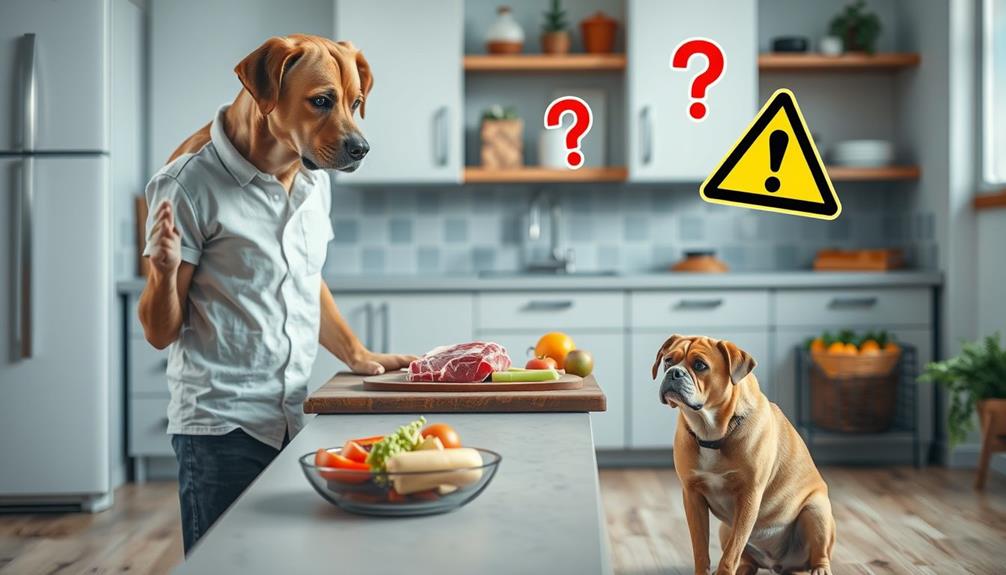
Despite the appealing benefits of a raw food diet for dogs, several risks and concerns warrant serious consideration. One significant issue is the higher risk of bacterial contamination, as pathogens like E. coli and Salmonella can't only affect your dog but also pose health problems for humans in your household. This is especially concerning if you have young children or immunocompromised individuals around.
Additionally, the emotional dysregulation seen in certain pets may be exacerbated by dietary changes, potentially affecting their behavior and relationships with family members the significance of understanding BPD dynamics.
Improperly balanced raw diets can lead to nutritional deficiencies over time, which negatively impacts your dog's overall health and well-being. If you're considering whole bones in the diet, be aware of choking hazards and the potential for dental fractures or internal injuries from fractured bone pieces.
Puppies are particularly at risk due to improper calcium-phosphorus ratios in raw diets, which can result in bone deformities that affect their growth and development.
It's crucial to weigh these risks against the potential benefits before committing to a raw food diet. Being informed and cautious helps guarantee your furry friend stays safe and healthy while you navigate their dietary needs.
Lifestyle Considerations

Adopting a raw food diet for your dog requires thoughtful lifestyle adjustments that can greatly impact your daily routine. As an owner, you need to take into account various factors, including preparation time, cost, and convenience.
Raw diets can be time-consuming, demanding careful planning to guarantee nutritional balance and safety for your pet. Additionally, similar to how crucial oils for respiratory health can benefit overall wellness, making sure your dog's meals are well-rounded can enhance their vitality.
Here are some key lifestyle considerations:
- Time Commitment: Regularly preparing raw meals can be challenging, especially if you have a busy schedule.
- Cost Implications: Raw food diets often come with a higher price tag than commercial kibble, which mightn't fit every owner's budget.
- Nutritional Monitoring: Inadequate preparation can lead to nutritional deficiencies, necessitating close attention to your dog's health.
- Convenience Factor: The daily preparation of raw food may not be as convenient as simply pouring kibble into a bowl.
Before making the switch to a raw food diet, it's crucial to evaluate your lifestyle and confirm you're ready for the commitment involved.
Balancing your time and budget can determine whether this diet is a practical choice for you and your furry friend.
Veterinary Consultation Importance

Before switching your dog to a raw food diet, it's essential to consult your veterinarian. They can provide personalized dietary recommendations and monitor your dog's health during the change to catch any potential issues early.
This proactive approach helps you avoid nutritional imbalances that could harm your furry friend.
Additionally, understanding the potential financial considerations for elderly care can help guarantee you're prepared for any unexpected veterinary costs associated with dietary changes.
Personalized Dietary Recommendations
Consulting a veterinarian is vital when considering a raw food diet for your dog.
Personalized dietary recommendations from a vet help guarantee your dog receives the right nutrients tailored to their specific needs, such as age, size, and health conditions.
A vet's expertise is essential to avoid nutritional imbalances that can arise from an improperly formulated raw diet, which may lack vital nutrients.
Additionally, understanding your dog's developmental needs, much like the key domains of development in psychology, can enhance dietary choices and overall well-being key domains of development.
Here are some key reasons why veterinary consultation is important:
- Tailored Nutrition: Your veterinarian will assess your dog's unique nutritional needs.
- Preventing Imbalances: They help you avoid deficiencies that could impact your dog's health.
- Safe Handling: Vets provide guidance on safe practices to minimize bacterial contamination risks.
- Health Monitoring: Regular check-ups allow for early identification of any health issues or deficiencies.
Monitoring Health Transitions
Monitoring your dog's health during a change to a raw food diet is essential for ensuring their well-being. A vet consultation before changing can help tailor a balanced diet that meets your dog's specific nutritional needs. Regular health monitoring is critical to identify any issues early, helping you to adjust the diet as necessary.
Veterinarians can also uncover underlying health conditions, such as kidney or liver issues, that might complicate the change. They offer guidance on the right mix of proteins, fats, vitamins, and minerals to minimize health risks associated with raw diets. Ongoing check-ups are crucial to maintaining overall health and adapting to any changes that arise during the diet change.
Here's a quick reference table for monitoring your dog's health:
| Health Aspect | Key Indicators | Recommended Action |
|---|---|---|
| Nutrition | Weight, coat condition | Consult vet for dietary adjustments |
| Digestion | Stool consistency, appetite | Monitor changes and report to vet |
| Energy Levels | Activity level | Assess energy and discuss with vet |
| Skin and Coat Health | Shedding, itching | Check for allergies or deficiencies |
| Overall Wellness | Behavior, mood | Regular vet visits for health checks |
Stay proactive and keep your dog's health in check during this dietary change!
Nutritional Imbalance Risks
Understanding the nutritional risks associated with a raw food diet is essential for your dog's health. Consulting a veterinarian before making this change can help prevent serious nutritional imbalances.
Raw diets can often lack crucial nutrients like calcium and phosphorus if not properly balanced, which can lead to severe health issues over time. Additionally, it's important to be aware of the importance of research when considering dietary changes for your pet.
Here are some key reasons to prioritize veterinary consultation:
- Nutritional Deficiencies: Without professional guidance, you might create a diet insufficient in vitamins and minerals.
- Tailored Advice: Your veterinarian can provide specialized dietary considerations based on your dog's specific health needs.
- Regular Monitoring: Frequent check-ups can help keep track of any deficiencies during the change to a raw food diet.
- Homemade Dangers: If you prepare raw meals at home, the risk of imbalances increases without accurate ingredient balancing.
Nutritional Balance and Preparation

Achieving nutritional balance in a raw food diet for dogs requires careful planning and attention to detail. You'll need to guarantee that your dog gets all the essential nutrients they require, like calcium and phosphorus. Consulting a veterinarian before making the change is vital; they can help tailor the diet to your dog's specific needs based on age, size, and health status.
The preparation of raw meals can be time-consuming, so it's important to use proper handling and storage techniques to minimize the risk of bacterial contamination. Regular monitoring of your dog's health and dietary intake during this shift is fundamental to catch any nutritional deficiencies or adverse effects early on.
Here's a simple overview to help you visualize what nutrients to include:
| Nutrient | Sources |
|---|---|
| Protein | Raw meats, eggs |
| Vitamins/Minerals | Vegetables, supplements |
Making the Right Choice
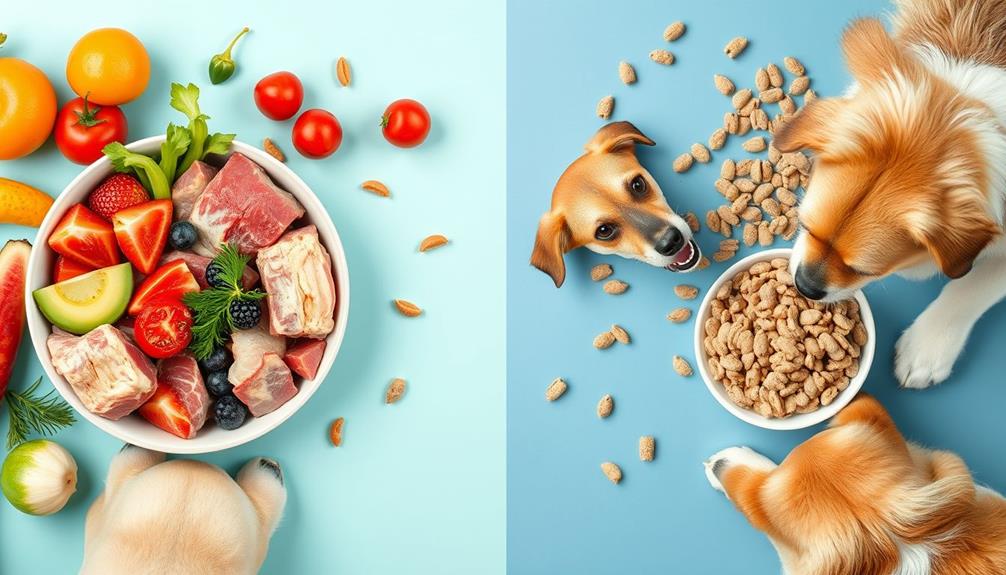
When considering a raw food diet for your dog, it's important to assess their individual needs, including age and health conditions.
Understanding the associated costs and time commitment is essential, as this diet can demand more from you than commercial options.
Additionally, evaluating your dog's nutritional requirements is significant to guarantee they receive a balanced diet and maintain ideal health, similar to how budgeting for pet care can help manage expenses effectively.
Consulting your veterinarian is a significant step to make sure you make an informed choice that benefits your furry friend.
Assessing Individual Dog Needs
Selecting the right diet for your dog involves carefully assessing their individual needs. It's important to evaluate factors like age, size, and activity level, as well as any existing health conditions that could affect the suitability of a raw food diet.
For instance, senior dogs or those with specific health issues may struggle with digestion, making it significant to analyze their unique requirements before shifting to raw foods. Additionally, guaranteeing a balanced diet rich in fundamental nutrients is critical for overall health and longevity, as lifestyle for longevity emphasizes the importance of proper nutrition.
You should also keep in mind:
- Activity Level: Working dogs may need higher calorie intake than a typical raw diet provides.
- Health Conditions: Dogs with food allergies or sensitivities could benefit from raw diets, but consult your veterinarian first.
- Nutritional Needs: Verify the raw diet meets all nutritional requirements, especially for specialized diets.
- Regular Check-ups: Schedule regular visits to the veterinarian to monitor your dog's health status and nutrition.
Cost and Time Factors
Considering the cost and time involved is essential when deciding on a raw food diet for your dog. Raw food diets can be considerably more expensive than commercial kibble, often costing $3-$5 per pound for quality raw ingredients, compared to just $1-$2 per pound for kibble.
Additionally, exploring best ways to earn money online can help offset these costs, providing financial flexibility for dog owners. You'll also need to factor in additional costs for supplements to guarantee your dog gets a balanced diet, pushing overall expenses even higher.
Meal preparation requires a substantial time investment. You'll need to source, thaw, and assemble raw ingredients, which can be challenging for busy dog owners.
If you can't dedicate enough time to meal prep, you risk creating nutritional deficiencies that could harm your dog's health.
It's vital to assess your financial and time resources before committing to a raw food diet. Consider whether you can consistently maintain this diet while providing your dog with the necessary nutrition.
If your lifestyle doesn't allow for the time and financial commitment, sticking to a high-quality kibble might be a more suitable choice for both you and your dog.
Veterinary Guidance Importance
Steering the change to a raw food diet for your dog can be overwhelming, but seeking veterinary guidance is key to making the right choice. Consulting a veterinarian, like Ian Billinghurst, guarantees that feeding a raw meat diet meets your dog's specific health needs.
It's important to identify potential health conditions, such as kidney or liver issues, allergies, and age-related concerns that may render a raw diet unsuitable.
Here are some reasons why veterinary guidance is significant:
- Tailored advice: Veterinarians can provide customized recommendations based on your dog's health profile.
- Health monitoring: Regular check-ups during the change help detect any nutritional deficiencies or adverse reactions early on.
- Avoiding serious health risks: Professional guidance minimizes the risk of creating an unbalanced diet that can lead to severe health issues.
- Nutritional balance: Making sure your dog receives essential nutrients is critical for long-term well-being.
Frequently Asked Questions
What Are the Downsides of Raw Diet for Dogs?
Raw diets can expose your dog to harmful bacteria, nutritional imbalances, and choking hazards from bones. They're often more expensive and require significant time for preparation, which can be burdensome for busy pet owners.
Do Vets Recommend a Raw Diet for Dogs?
Imagine a wise owl guiding you through a forest of choices. Vets often caution against raw diets for dogs, highlighting potential risks. They recommend consulting them first to guarantee your pup's nutritional needs are met safely.
Do Dogs Do Better on a Raw Diet?
Dogs may thrive on a raw diet, experiencing benefits like better energy and coat quality. However, individual health factors matter. You should consult your vet to determine if it's suitable for your dog's needs.
Is Raw Food Better for Dogs Than Kibble?
When deciding if raw food's better than kibble for your dog, consider their health, lifestyle, and nutritional needs. Each option has benefits and drawbacks, so it's crucial to evaluate what works best for your pet.
Conclusion
In the end, choosing a raw food diet for your dog is like charting a winding river—you need to be aware of the twists and turns. While a raw diet can offer health benefits, it is vital to weigh the risks and guarantee nutritional balance. Consulting with your vet is fundamental to steer clear of potential pitfalls. Ultimately, your dog's health and happiness are the most important, so take the time to make an informed choice that feels right for both of you.

